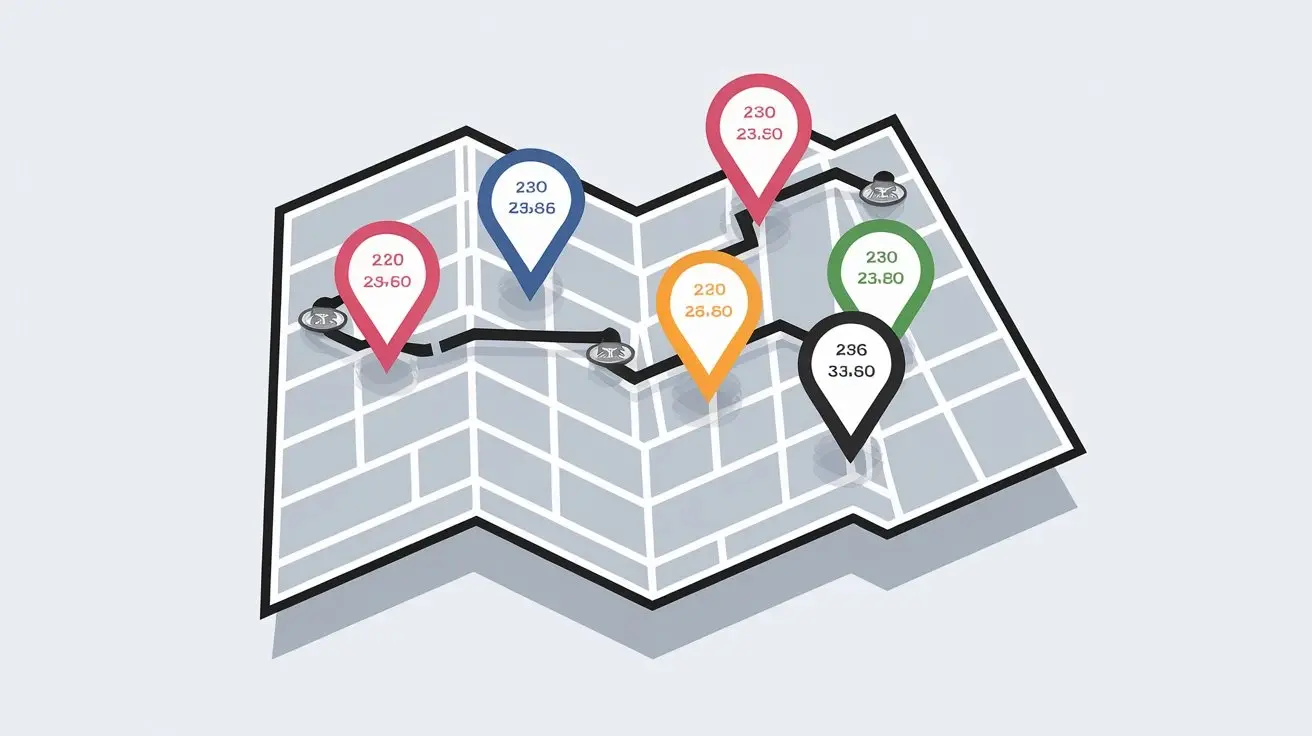Compare Local Internet Providers Near Me

What are the top internet providers near me?
The top internet providers near you may include well-known companies such as Xfinity, AT&T, Spectrum, Verizon Fios, and Cox Communications. Check availability in your area to find the best cable internet plans that suit your needs for speed, reliability, and pricing.

Key Highlights
- Speed and Reliability: Assess your household's internet speed needs based on usage like streaming, gaming, or video calls.
- Connection Type: Explore different internet connection types, including broadband, fiber-optic, and satellite, each with pros and cons.
- Provider Options: Research and compare various internet service providers, their plans, pricing, and unique offerings.
- Coverage Area: Ensure the internet provider you choose offers service in your location by checking their coverage map.
- Customer Reviews: Gain insights from customer reviews to understand the real-world performance and customer service of internet providers.
- Contract Flexibility: Compare contract terms and early termination fees and explore no-contract options to find the best fit for your needs.
Introduction
In today's world, a good and fast home internet service connection is essential. Many internet service providers (ISPs) offer different home internet plans. This can make it hard to choose the best internet service for your needs. This guide will help you learn how to compare local internet providers. You will be able to make a smart choice about your internet connection.
Understanding Your Internet Needs

Before you compare internet providers, you need to know what you need. Think about how many people live with you, how you use the internet, and how many devices you connect.
Consider how you mostly use the internet and the number of devices that will be connected. Do you watch high-definition movies, play online games, or often have video calls for work or chat with family? These activities need more internet speed and data than just browsing the web or checking emails.
Assessing Speed Requirements for Home and Business
When picking an internet plan, internet speed matters a lot. It's shown in Mbps (Megabits per second), and higher numbers usually mean faster internet.
- Light users (browsing, emailing, social media): 25-50 Mbps is often enough.
- Moderate users (streaming, online gaming, using multiple devices): 100-300 Mbps provides a smoother experience.
- Heavy users (4K streaming, competitive gaming, big households): Gigabit speeds (940 Mbps or more) are best for great performance.
For businesses, the needed internet speed depends on the type of work and how many employees need the connection. Activities like video conferencing, large file transfers, and using cloud-based apps need a stronger internet connection.
The Importance of Reliability and Customer Service
Reliability is just as important as Internet speed. This is crucial for people who work from home or need a stable connection for their business. Having frequent outages or slow speeds can be very frustrating and can hurt productivity.
The quality of customer service from your ISP is also very important. When problems happen, you want to know that your provider will give you quick and effective support. Check customer reviews and ratings to see how satisfied people are with their internet service provider. Look for the best cheap internet options that also provide reliable customer support.
Types of Internet Connections Available

It is important to understand the different types of internet connections available in your area. Each type has its benefits and downsides related to speed, reliability, and cost.
Things like where you live, how close you are to infrastructure, and what you can afford will affect which connection types you can use and which are best for you. Let's check out the most common types of internet connections.
Broadband: Speed vs. Cost
Broadband is a term that means different types of high-speed internet connections. This includes cable and DSL internet.
Cable internet uses the same lines as your cable TV to give you fast broadband speeds. On the other hand, DSL internet works with existing telephone lines. While DSL is usually easier to find, cable internet often has faster download speeds.
When you think about broadband, comparing speeds with competitive pricing is important. You want to find a balance that fits your budget and internet needs. For example, some cheap internet options may offer slower speeds than more expensive plans.
Fiber-Optic: The Future of Internet Connectivity
Fiber-optic internet is becoming the best choice for home internet. This is because it is super fast and very reliable. It sends data using light through thin glass or plastic fibers. This results in really quick speeds.
If you want the fastest internet provider with symmetrical upload and the same download speeds, fiber internet is the best option. Fiber availability is growing but is still only found in certain areas, especially in cities and suburbs.
Satellite Internet: Solutions for Rural Areas
For people living in rural areas with few options for broadband or fiber internet, satellite internet is a good choice. It connects to the internet through satellites that orbit the Earth.
While it is available in many places, satellite internet usually has high latency. This makes it not great for online gaming or video calls. Here are the advantages and disadvantages:
- Pros: It is Available in many areas, a decent choice for remote locations.
- Cons: Affected by bad weather, high latency, and may cost more than other types of internet.
Top Internet Providers in the United States

The Internet service in the US is mostly run by major companies. Each one has different plans and coverage zones. Knowing these providers is important when you begin looking for Internet service.
There are big telecom companies and smaller local ones. The competition is tough. This often leads to good deals and competitive pricing. But you should also think about long-term costs and standard rates. Price increases can happen after a promotional deal ends. So, keep this in mind when you compare internet options.
Overview of Leading Providers and Their Unique Selling Points
- Xfinity: This is popular for a large cable network and fast speeds. Xfinity has different plans, but watch out for data caps and price changes based on where you live.
- Spectrum: This option is good for people who want no-contract plans and unlimited data. You won’t have to worry about going over your data limit.
- Verizon Fios: Known for its fiber-optic network, Verizon Fios offers great speed and reliability. It's a great choice for heavy internet users.
- AT&T: A strong player in fiber and DSL markets. However, its DSL service may not be as fast or reliable as its fiber internet.
- T-Mobile: This provider uses a wide 5G network for home internet. It often attracts new customers with good introductory prices.
In the end, the best internet provider for you depends on where you live, what you need, and how much you want to spend.
Comparing Plans, Pricing, and Promotions
Once you've identified potential providers in your area, the next step is to compare their plans, pricing, and promotional offerings, keeping in mind any additional charges that may apply. Providers often showcase a range of plans with varying speeds and data allowances, making it essential to choose one that aligns with your household's typical internet consumption.
Pay close attention to promotional periods and any potential price increases that may occur after the initial offer expires. Don't hesitate to ask providers about equipment rentals or purchase options, as owning your modem and router can often lead to long-term savings.
Here's a sample table showcasing plan options from various providers:
|
Provider |
Plan Name |
Speed |
Price |
Promo Period |
|
Connect |
150 Mbps |
$19.99/mo. |
12 Months |
|
|
Internet® Premier |
500 Mbps |
$50/mo. |
12 Months |
|
|
Fios 300 Mbps |
300 Mbps |
$49.99/mo. |
24 Months |
|
|
Internet 300 |
300 Mbps |
$55/mo. |
12 Months |
Exploring Coverage Maps: Finding Providers in Your Area
Before you choose a specific provider or plan, it is very important to check if they are available in your area. Most internet providers have online coverage maps. You can enter your address to see which internet options you can get.
These maps usually show the type of internet service you might have, like cable, fiber, DSL, or fixed wireless. They also give estimated speeds. Remember, coverage maps are just a rough guide. It’s best to call the provider to make sure they can serve your exact address.
How to Compare Internet Providers Effectively?

Comparing internet providers requires more than just checking the price. You should also look at customer reviews and understand the contract details. It's important to find any hidden fees too. Doing this helps you choose a service that fits your needs and budget better.
Reading Between the Lines of Customer Reviews
Customer reviews give you useful information about what others experience with an internet provider. Even though everyone has different experiences, a lot of positive or negative reviews can show trends in customer satisfaction.
When you read reviews, focus on what people say about the actual speeds compared to advertised speeds. Also, look for comments about how reliable the service is and how well the provider's customer service responds. By mixing customer reviews with facts like pricing and plan features, you can get a complete picture of each provider.
Understanding Contract Terms and Conditions
Before you choose an internet provider, look carefully at their contract terms and conditions. Focus on these features:
- Contract length: Some providers need you to sign annual contracts, but others have plans without contracts for more flexibility.
- Early termination fees: Know the costs if you cancel your service before the contract ends.
- Data caps and overage charges: Check if there are limits on data use and fees for going over those limits.
Reading the fine print can help you avoid surprises. It will also make sure you are okay with the terms of service.
The Significance of No-Contract Options
No-contract options are getting more popular. They are great for people who want flexibility or move around a lot. These plans avoid early termination fees. This makes it easier to switch providers if your needs change.
But keep in mind that no-contract plans can sometimes have higher monthly prices than those with contracts. Also, providers without contracts may not offer big discounts or promotions. This is because they are not as focused on keeping customers. If you want the option to change providers anytime without penalties, no-contract plans might be a good choice, even if they cost a bit more. For many, choosing to avoid a contract and any extra fees is the best internet service decision.
Maximizing Your Internet Experience
Improving your home network can change how you use the internet. It helps you get the best from your internet service.
You can boost your Wi-Fi signal and solve common issues that affect speed. With these easy tips, you might also find better offers from your provider.
Tips for Enhancing Wi-Fi Signal Strength at Home
Weak Wi-Fi signals can slow down your internet and cause dropouts. Here are some simple tips to improve your Wi-Fi signal:
- Router Placement: Place your router in the middle of your home. Keep it away from walls and other objects.
- Interference: Move your router away from electronics that can interrupt the signal, like microwaves and cordless phones.
- Wi-Fi Extenders: Think about using Wi-Fi extenders or mesh networks. They can help strengthen your Wi-Fi signal in areas with poor coverage.
Using these strategies can greatly improve your wireless Internet experience.
The Role of Modems and Routers in Internet Performance
Your modem and router are important for how well your internet works. The modem links your home network to the internet. The router sends the internet signal to all areas of your home.
- Up-to-date Equipment: Old or mismatched modems and routers can slow down your internet speed. Check with your provider to make sure your equipment works well with their service. Think about getting newer models for the best performance, especially if you have fast fiber internet.
- Router Settings: Look into your router's settings. You can change options like Wi-Fi channels and security methods, which can affect how your network performs. You might find help in your router’s manual or from your ISP’s support to make these settings better.
Negotiating for Better Deals and Upgrades
Don't hesitate to talk to your internet provider about getting better deals or upgrades. If you have been a customer for a long time or found lower prices with other providers, reach out to your provider. Ask about any special offers, discounts on equipment charges, or speed upgrades you could get.
Staying updated on new internet options and being open to exploring can help you save money and enjoy a better internet experience.
The Impact of 5G on Local Internet Choices

5G technology is quickly transforming how we connect to the internet. It offers both chances and hurdles for people who want the best Internet service.
It's important to know how 5G impacts internet speed, cost, and availability. This knowledge will help you make smart choices about your future internet needs.
What 5G Means for Home Internet Users
For people using home internet, 5G provides the chance for gig-speed internet. This speed can match or even be faster than what traditional wired options, like cable and fiber, can offer.
5G is a wireless tech that uses a higher frequency to send data much quickly. Still, it's important to remember that how well 5G works can depend on things like how close you are to cell towers, how busy the network is, and whether you have devices that support 5 G.
Availability of 5G Services and Expected Rollouts
The use of 5G services is growing, but it is still not available in many places, especially in rural and suburban areas. Right now, big phone companies like Verizon and T-Mobile are taking the lead. They are working on expanding their 5G networks, mainly in big cities.
Watch for news and updates from internet providers about when 5G will be available more widely in your area. As the 5G network gets better, people can expect more options and possibly better deals on fast internet plans, especially for a limited time.
Preparing for Future Internet Needs
As technology grows fast, it's important to think about your future internet needs when picking a provider and plan today.
Knowing about new tech and internet options will help your home stay connected. This will also let you enjoy the newest updates and improvements.
Upcoming Technological Advances in Internet Service
Several new tech trends could change the internet world:
- Wi-Fi 6 and Beyond: This latest Wi-Fi technology brings faster speeds. It also supports more devices at once and works better in crowded places.
- Low Earth Orbit (LEO) Satellites: These satellites provide the chance for speedy internet with less delay compared to regular satellite internet, especially in far-off areas.
- Fiber Optic Expansion: Internet service providers are working to expand their fiber-optic networks. This growth helps make faster and more reliable internet available to more users.
How to Stay Informed About New Internet Options
Staying updated on the latest internet choices means you need to take some active steps. Here are a few tips:
- Read Industry News: Keep track of new developments in internet technology and what providers offer by following trustworthy tech news sites and blogs.
- Visit Provider Websites: Check internet providers’ websites often to find out about new plans, pricing, and the latest news. This is important for learning about fiber network expansions or 5G services offered in your area.
- Talk to Fiber Providers: Contact fiber providers like Verizon Fios or Google Fiber to ask about their growth plans and if their services might be available where you live.
Conclusion
In conclusion, picking the right internet provider is important. You should think about things like speed, reliability, and service quality. Knowing what you need and comparing different providers can help you have a good experience. Check customer reviews, contact details, and coverage maps to make the best choice. You can improve your internet connection by boosting Wi-Fi signals, looking for better deals, and staying updated on new technology. With 5G technology coming, be ready for future needs by looking into new services. If you stay informed and proactive, you can have a smooth internet connection that fits your needs.
Call (855) 210-8883 to get the best internet deals and offers now!
Faq
How do I find out which internet providers are available in my area?
To quickly find internet service providers in your area, you can use websites like provider pages or comparison sites. Many of these sites let you enter your address or zip code. Then, you can see a list of internet service providers in your area, along with their internet options. You can also check coverage maps from different providers to see a visual of where they offer service.
Which internet provider offers the best value for money?
Finding the best value for your money in internet service can be tricky. You need to think about many things. It's important to compare prices and look at long-term costs. This includes possible price increases after the initial deals end. The best cheap internet plans focus on both cost and service quality. Look for providers that offer a good mix of speed, data limits, and customer satisfaction that fit your budget. This will help you find the option that gives you the best value.
Can I change my internet provider if I'm not satisfied?
Yes, you can often change your internet provider if you are not happy with their services. However, be careful about your contract terms. If you have an annual contract, you might have to pay early termination fees if you stop using their service early. So, it is important to read the applicable service terms and conditions closely before you decide to switch.
What should I do if my internet speed is slower than promised?
If your internet speed is usually slower than what your provider said, it's important to take action. First, run a speed test to see your current speeds. If the results are much lower than your plan shows, reach out to your provider's customer service. They might help you fix the problem over the phone, suggest solutions, or send someone to check for problems.
Are there any truly unlimited internet plans available?
Many internet providers say they offer
How does weather affect satellite internet connectivity?
Satellite internet uses signals sent between a satellite in space and a dish at your home. Bad weather, like heavy rain, snow, or thick clouds, can block these signals. This can make your internet slower, cause higher delays, or even cut off your connection. While satellite internet technology has become better at handling weather issues, it's important to keep this in mind. This is especially true if you live where the weather is often bad. If you are in a rural area where satellite internet is your main choice, be ready for possible issues during bad weather.





